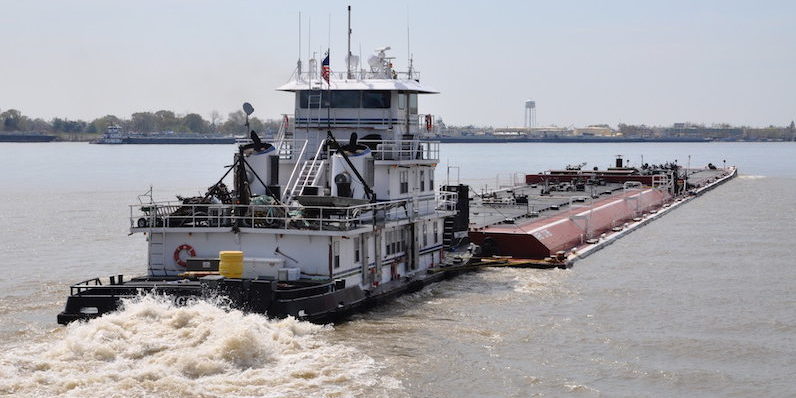Kirby Corp., Houston, announced net earnings yesterday for the fourth quarter ended Dec. 31, 2017, of $231.3 million, or $3.87 per share, compared with $32.4 million, or 60 cents per share, for the 2016 fourth quarter.
Consolidated revenues for the 2017 fourth quarter were $708.1 million compared with $435.7 million for the 2016 fourth quarter. Kirby reported net earnings for the full year 2017 of $313.2 million, or $5.62 per share, compared with $141.4 million, or $2.62 per share, for 2016. Consolidated revenues for 2017 were $2.21 billion compared with $1.77 billion for 2016.
In a statement, David Grzebinski, Kirby's president and CEO, said that fourth quarter earnings were "impacted by a sizable one-time benefit related to U.S. tax reform, as well as impairment, severance and workforce early retirement charges." He added that earnings from operations were stronger than anticipated primarily because of a significant increase in product and service demand across the company's entire distribution and services segment, particularly its land-based market. "In our marine transportation segment, continued high utilization and demand in our inland market were partially offset by ongoing weakness in our coastal business," he said.
Kirby's inland marine utilization remained in the low- to mid-90% range in the fourth quarter. The company benefitted from a favorable pricing environment for its customers' products and new petrochemical capacity led to increased movement of petrochemicals and crude oil by tank barge. During the quarter, Kirby took several actions to improve efficiency. This included workforce reductions and early retirements, and the sale of aging and inefficient towboats.
Kirby's coastal marine business continued to suffer with fourth quarter results adversely affected by low year-over-year spot market pricing and declining fleet utilization as barges transitioned from term contracts into the spot market. The company took proactive measures during the fourth quarter including shoreside workforce reductions and the impairment and early retirement of barges and tugs from the coastal fleet. "We believe these actions are a critical step to remove excess capacity from the industry's fleet and help accelerate balance in the market," Grzebinski said. "We hope that the industry follows our lead and also retires equipment."
During the quarter, Kirby retired 11 coastal barges, many which would have required ballast water treatment system installations in the next few years, and 21 tugs. The vessels will be scrapped or sold into international or non-competing markets.
On the inland side during 2017, Kirby retired 53 tank barges, closing out the year with 841 barges in its fleet, representing 17.3 million bbls. of capacity. In 2018, Kirby expects to take delivery of one 30,000-bbl. inland tank barge in the first quarter. The company estimates it will end 2018 with a total fleet of 812 barges, representing 16.8 million bbls. of capacity.
In today's quarterly earnings call with analysts, Joe Pyne, Kirby's chairman, said that in 2018 economists are projecting the largest GDP growth since the start of the downturn. This plus the fact that much of Kirby's petrochemical demand is tied to consumer nondurable goods and the expectation that 30 new petrochemical plants will be completed in the next two years, Pyne said "we have a favorable long-term outlook for this business."
"While parts of the marine transportation segment remain challenged, the inland business should begin to improve in 2018 as the industry rightsizes and consolidates," Pyne added.
"We entered 2018 with optimism in our marine transportation businesses," Grzebinski told analysts. "Demand for inland barges is expected to remain high and we believe that pricing inflection will occur in the second half of 2018, if not sooner."




